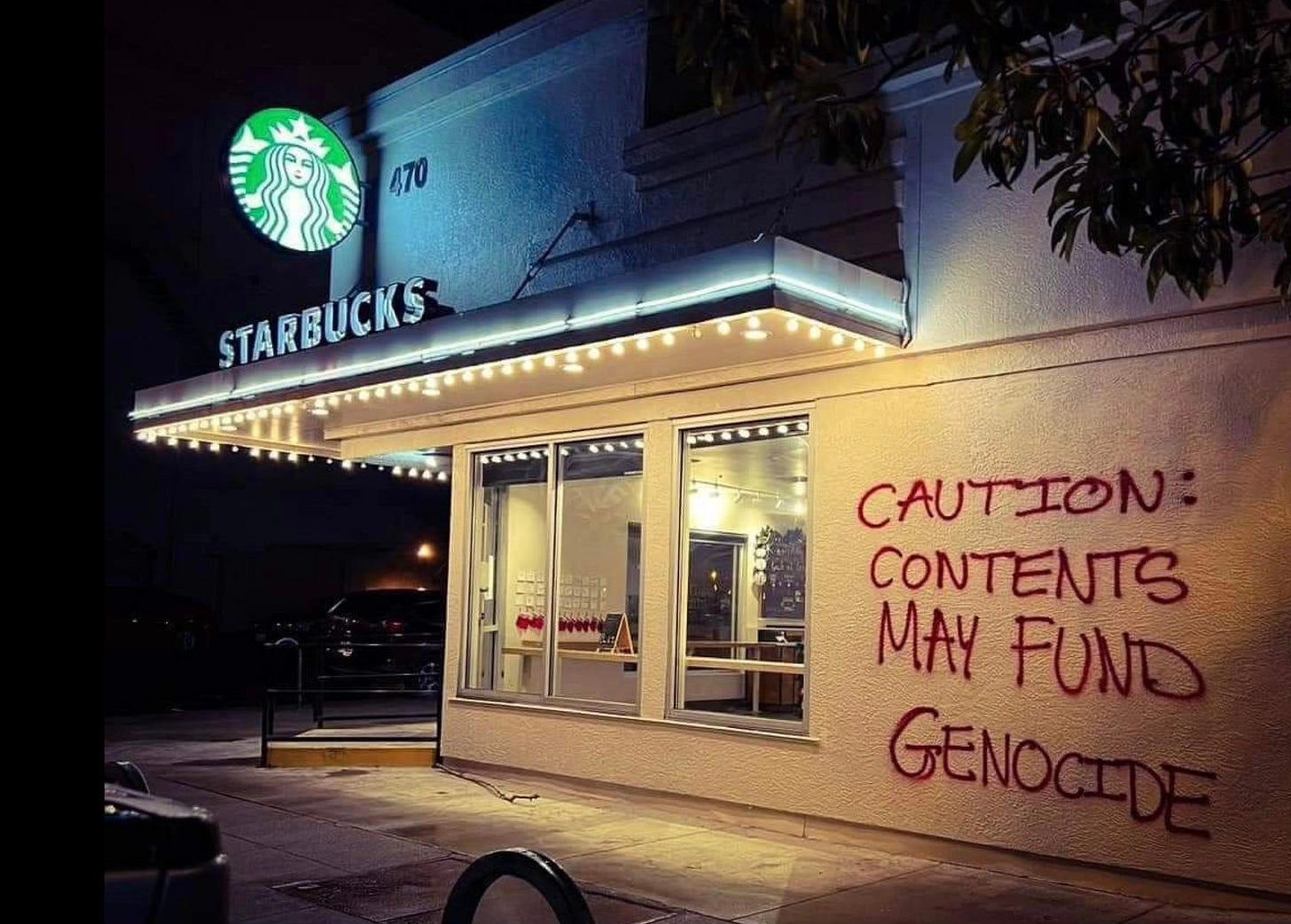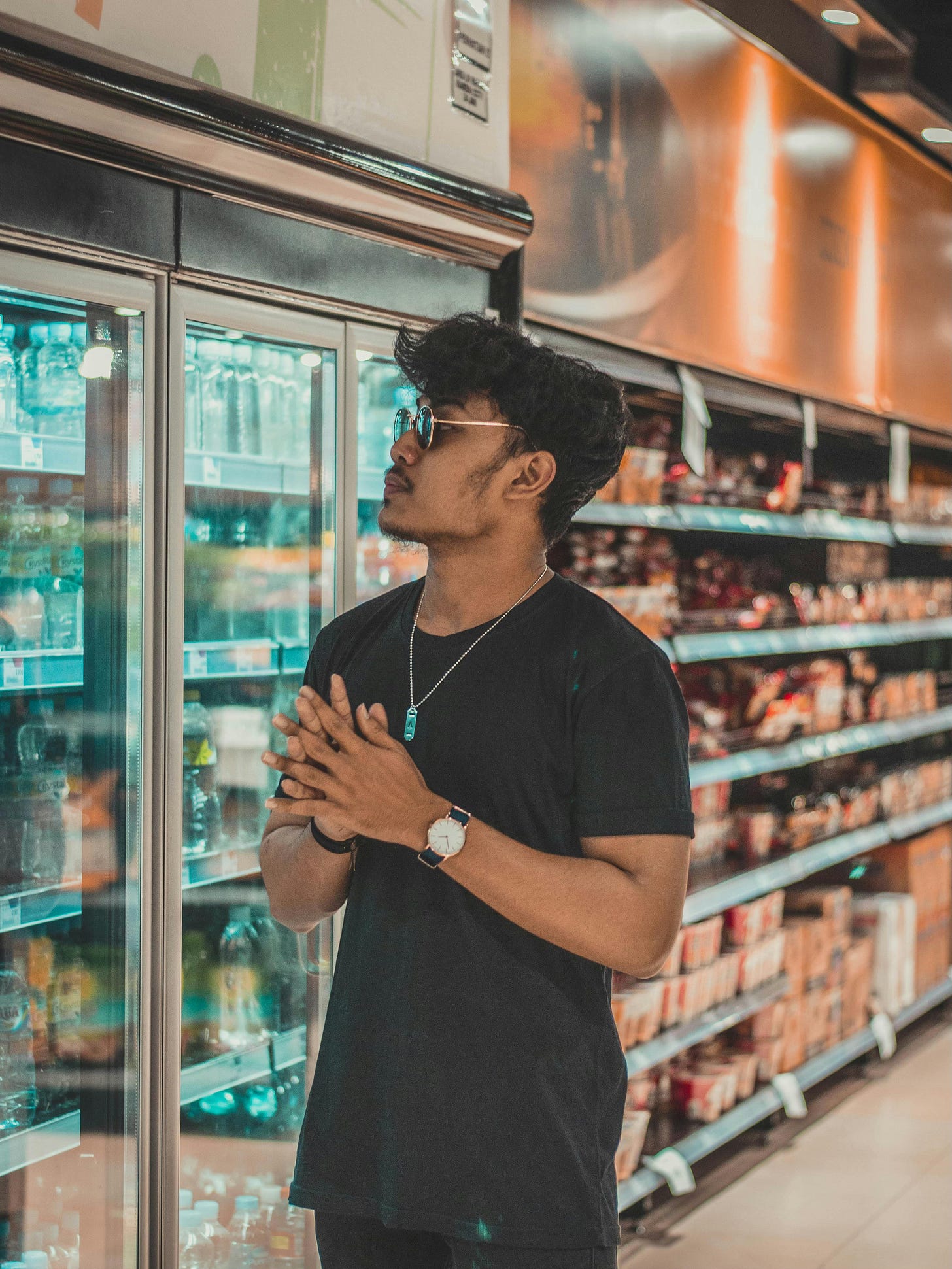#2: The impact of and etiquette for boycotting in a time of genocide
Boycotting brands and companies complicit in genocide—what's the point, exactly? And how can I participate without having to empty my entire home? Your questions answered:
Editing by Rohaizatul Azhar
This essay is the first of the multi-part series #DecolonisingTheWorld, an exercise in helping us reclaim our sense of humanity—one hefty piece of research, writing and reporting at a time.

You must’ve come across comments on the social media pages of companies like McDonald’s & Starbucks filled with the Palestinian flag emojis or TikTok videos of make-up girlies proudly showing off their boycott-free beauty products in their Get Ready With Me (GRWM) videos.
This surge in boycotting has a rich history behind it and a renewed urgency today.
Boycotting Israeli products isn't a new concept.
The Boycott, Divest and Sanctions (BDS) global movement, which began in 2005, has long aimed to apply pressure on Israel to comply with international law and Palestinian rights. However, the heartbreaking escalation of violence and almost daily massacre in Gaza since October 2023 has reignited this movement, bringing it back into our daily conversations and actions.
So, what exactly is a boycott?
In simple terms, a boycott is a form of protest in which individuals or groups refuse to buy, use or deal with a person, organisation or country, to push for political, economic or social change.
Think of it as a way to hit them where it hurts—their pockets—without resorting to violence.
The goal? To shine a spotlight on massive systemic issues and galvanise prompt change. In the context of Gaza, the goals include ending the decades-long violence and—depending on where you stand—returning Palestinians their land or coming to a peaceful two-state solution.
It is important to note that boycotts are typically nonviolent.
To reiterate, a boycott demands a higher awareness of significant problems and to effect positive change by drawing public attention to and/or causing economic harm the targets and their practices.
“Do boycotts even work?”
You’ve probably heard someone say this.
You might’ve asked this question yourself.
Many wonder if switching brands really makes a difference in global politics.
The answer is complex—you’re right in anticipating that. But it’s also more interesting than you probably expected.
Boycotts are not just economic—they are also cultural. It’s not just about draining oppressors of their reserves, it’s also about making it undesirable—both socially and culturally—to even be associated with the oppressor (in the case of Israel’s war on Gaza, the oppressor identifies itself as a country and nation).
Take the South Africa boycott movement as an example.
It wasn’t just that other countries stopped buying South African goods.
In the United Kingdom, the musicians’ union blocked South African artists from playing on their radio programmes and most performers refused to perform in the then-apartheid state. Read this report by The Guardian about how boycotts and sanctions helped rid South Africa of apartheid.
Even the South African cricket and rugby teams were banned from participating internationally
The boycott movement was sustained over 30 years before apartheid was finally dismantled.
"The cause of my oppressed brothers and sisters in Palestine is more important to me than the needs of Israeli fans of my music in Israel … I will be there in a heartbeat when human rights apply to all in Israel and the occupied territories."—Pink Floyd’s Roger Waters
Still not convinced? Then, consider this: Pro-Israel groups in the US have worked tirelessly to persuade US states to pass anti-boycott laws. As of 2020, it is illegal for anyone or any businesses to boycott Israel in more than 33 states across the United States.
If boycotts don’t matter, why go through all that trouble?
Now let’s talk about the financial impact so far.
An annual Trust Barometer report polled 15,000 consumers across 15 countries and found that more than one in three people say they are boycotting a brand viewed as supporting a side in Israel's genocide of Gaza.
Israel’s Maariv newspaper reported that 40,000 Israeli companies have closed their doors since October 2023 and the number is expected to rise to 60,000 by the end of 2024.
US coffee and fast-food outlets Starbucks, McDonald's and KFC are experiencing lower than expected financial performances and the closure of scores of franchises not just in the US, but globally.
Culturally, musicians such as Pink Floyd's Roger Waters, a member of the BDS movement, has been calling on his fellow musicians to not perform in Israel.
"The cause of my oppressed brothers and sisters in Palestine is more important to me than the needs of Israeli fans of my music in Israel," he said. "I will be there in a heartbeat when human rights apply to all in Israel and the occupied territories."
More recently, 130 musicians and bands withdrew from playing at a festival in the United Kingdom over the event's sponsor, Barclays Bank, and its links to Israel. Besides just musicians, hundreds of actors, filmmakers, and other artists, including Selena Gomez, Billie Eilish, and Mark Ruffalo, have signed the Artists4Ceasefire letter to President Joe Biden.
The case for boycotting
Look—even if boycotts have become more mainstream or acceptable to more people, participating in the boycott is a vote for your principles.
It may not stop the violence overnight and the genocide may not end tomorrow, but knowing that your hard-earned money isn't contributing to the suffering of civilians should give you peace of mind.
Your participation in the boycott is more than just economic action. Rather, it speaks of your commitment to justice and humanity. Each time you make a conscious choice about where your money goes, you reinforce the idea that individual actions, collectively, can lead to meaningful change. Knowing that you are part of a larger movement, standing in solidarity with others who share your values, can be empowering.
But boycotting effectively also means doing it thoughtfully and responsibly. It's not just about abstaining from certain products or services; it's about doing so in a way that aligns with ethical principles and practical considerations. So, here is a basic (and practical) etiquette (or “adab”, a word used in classical Malay, adopted from the Arabic language) guide for boycotting that can help you navigate your personal boycott adventure.
1. Don't throw out what you already own

While the instinct to immediately stand on the right side of humanity is commendable, throwing out what you already own promotes wastefulness. This not only wastes the money you worked hard to earn but also deprives someone else who might desperately need that item—be it food, clothing, or electronics. Additionally, this approach puts unnecessary pressure on yourself, potentially leading to burnout and, God forbid, ambivalence.
The drive to take immediate action against perceived injustices is precious because it stems from a genuine desire to do good. However, it's important to channel that drive in sustainable and thoughtful ways. Wastefulness is counterproductive and can lead to desensitisation, where the constant push to take drastic measures diminishes our sensitivity to the very issues we care about. This desensitisation can become more harmful than the initial problem, as it fosters a cycle of short-lived, reactionary responses rather than sustained, impactful change.
Do these instead:
Finish what you have: Use up the FMCG (fast-moving consumer goods) you’ve already opened. This could be your half-used bottle of shampoo or shower gel made by a L’oreal brand or it could be your collection of Nespresso capsules. The same principle applies to fast fashion. If your pair of Zara trousers has become a staple, keep wearing them.
Just don’t encourage others to buy from the brand by tagging Zara in your Outft of the Day (OOTD) photos and if others ask, “Ooh I like your pants—where are they from?”, simply say, “It’s a brand I’m boycotting so I would rather not say. This not only deprives the brand of free marketing; it also communicates your boundaries as a consumer and raises awareness of the seriousness of the issue.
Your participation in the boycott is more than just economic action. Rather, it speaks of your commitment to justice and humanity. Each time you make a conscious choice about where your money goes, you reinforce the idea that individual actions, collectively, can lead to meaningful change.—Activist and best-selling Singaporean author Ameera Aslam
Look for ground-up initiatives (like Chariteh Singapore) that collect good-quality clothing, and sometimes other items like stationery and even furniture, and enquire about drop-offs.
Just remember that ground-up initiatives are usually completely independently funded so responses may be delayed. Be patient. Neatly set aside what you no longer wear or need (make sure they’re of good quality—something you’d actually give your friends and family), and wait for a response.In the same vein, research charity organisations that collect good-quality and non-expired essential items that would be happy to receive them. Remember, there’s adab around donating to charity as well, which we may address in another issue.

2. Don't force yourself into extremes.
Don’t expect to “decolonise” your household overnight—it’s not like the Christmas Eve myth (oops—make sure your kids don’t see this), where Santa and his elves place everything you want under a beautifully decorated Christmas tree for you to wake up to on Christmas morning.
Do this instead:
Take your time.
For example, if you own a Sodastream, ask yourself: “Do I really need it?” The people in Gaza have ghastly limited access to water. Israel exerts an almost insurmountable access to water in the Occupied Palestinian Territories, including rainwater.
All you need to survive really, is water, and just practising gratitude for having easy access to clean water is a good first step. Only you can change your own perspective, so work on that first.
If and when you decide you don’t need a Sodastream (and we really hope you do), you may consider stopping any subscriptions you have for “supplementary” items from the same brand, such as mixes and tablets.
If you’re not subscribed, simply stop buying more products from the brand and unsubscribe to all their promotional emails. Don’t forget to also block them and adjust your privacy settings such that they are forced to delete your data or face legal action.
The same applies to something like a Nespresso machine. Some of us still have our Nespresso machines—we just no longer buy Starbucks or Nespresso capsules and instead purchase alternatives from Nusantara brands. Tanamera is one.
3. If in doubt, simply don’t buy
In the Malay-Muslim culture, there’s a concept called “was-was”. In the Arabic language, from which Malay and many other languages borrow, “was was” translates to “evil whisperings”.
Now that you’re aware of this concept, you will start to notice how often you or your Malay peers use this phrase.
Many companies are protecting themselves from the impact of the boycott by deleting evidence (for example, LVMH deleted a press release announcing their founder’s investment and partnership with a company that helps build Israeli intelligence technology within 24 hours of us finding it).
BDS websites, while helpful, are not always updated and comprehensive. These are, after all, people volunteering their extra time and sacrificing sleep towards the movement.
If you feel a bad vibe from the brand, don’t purchase from it. Check-in with yourself: How do you feel about the way the brand is marketing itself? Are their emails pushy? Are they ignoring world affairs? Focus on the top companies first and take your time making decisions..
Again, take your time.
Remember: Complicity, advocacy and activism all belong on one spectrum. Your job, as a human being, is to move your needle of contribution towards advocacy. Whether you're switching brands, supporting ethical companies, or spreading awareness, your role in this movement is crucial. So, let’s continue to stand up for justice, one thoughtful decision at a time.

Make a list (we know most of you folks love making lists) and check it twice. Gotta find out who’s naughty and nice.
Need an alternative for coffee capsules? There’s Morning and Tanamera.
Loved Aesop? There’s Lush. I (Hidayah) personally adore their Twilight collection.
Make sure you don’t miss future parts of the #DecolonisingTheWorld series—as well as other essays by founder Hidayah Salamat and other women born, raised or living in the Nusantara—by subscribing to the GADIS GILA newsletter.
If you enjoyed reading this and know someone who might benefit from reading about this journey, do send them this email!
And feel free to hit reply and share some of your own tips and revelations—we’d love to hear from you.
Thank you for reading!






As an economist in Israel who works tirelessly with both the Arab Israeli and Palestinian communities, I can say two things:
1. BDS initiatives actually harm Palestinians, Arab Israelis, and the wider Muslim world
2. BDS initiatives are almost always driven by false premises and/or lies, and all of them have complete lack of any knowledge of how the global economy works.
I have started to unpack every single one of these initiatives an post them on Substack. I encourage you to read and share widely in order to understand how these initiatives actually play out:
This is the first one, on Starbucks:
https://substack.com/home/post/p-148725552?r=fgc1l&utm_campaign=post&utm_medium=web